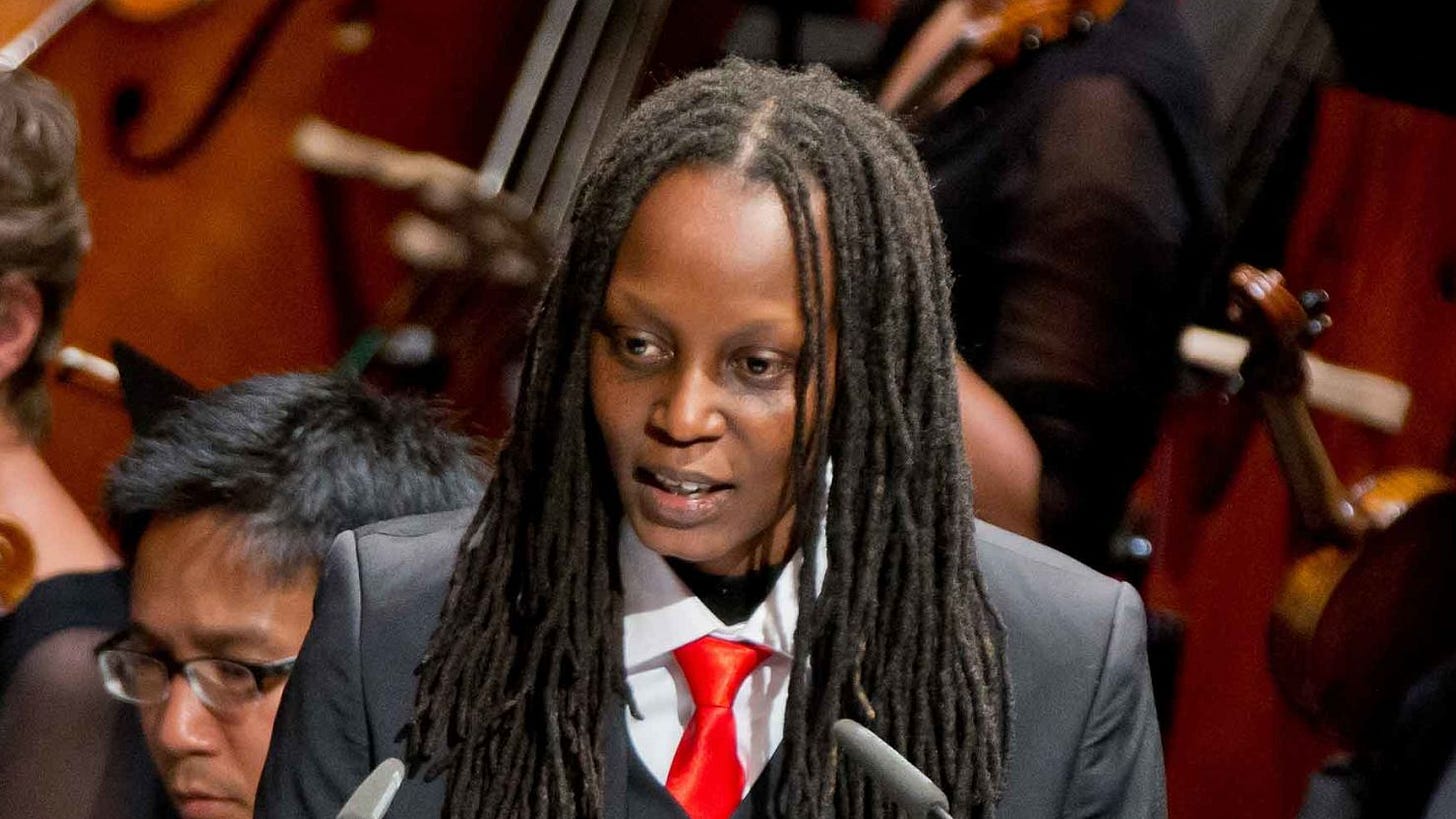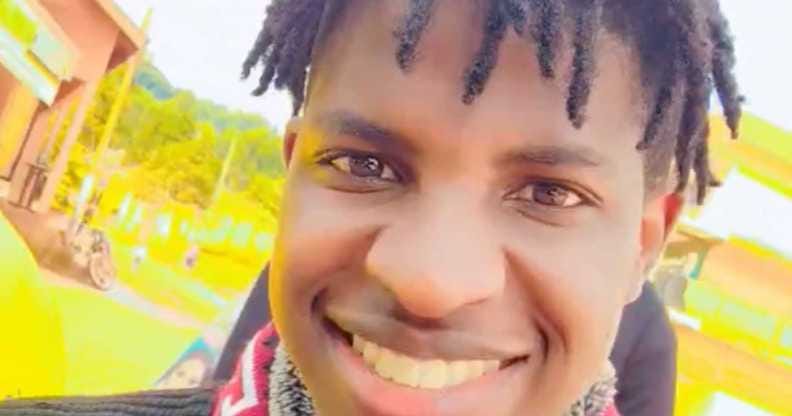Global Roundup: Maasai Women Photographers, Uganda & Burundi LGBTQ+ Activists, Argentina Feminist Journalists, Mi'kmaw Women Celebrate National Ribbon Skirt Day
Curated by FG Contributor Samiha Hossain
Ng’oto Keruke, an elder woman in Melili, Narok. She and her ailing husband relocated from from Maasai Mara a few years ago to escape a severe drought. Photograph: Irene Naneu/Lensational
A prolonged drought that has gripped the country and the wider horn of Africa has made life more challenging for women in pastoralist communities. The growing care burden of these women on the frontline of the climate crisis is the subject of a recent photo series by Maasai photographers Claire Metito and Irene Naneu.
Metito chose to depict her mother-in-law Pilale Rikoiyan’s experiences because the matriarch’s life reflects the harsh realities that have become normalised, even among the women themselves. Rikoiyan and other women in their seven-family household go to great lengths to care for sick cattle and keep their herd alive, but they have lost most of their cows to the drought in recent years, and have to rely for milk on goats, which produce only a fraction of the supply.
Metito, a nursery school teacher and mother of four, sees Rikoiyan wake up at the break of dawn each morning to begin housework and childcare as Metito and other women in their multigenerational household trek for hours to find firewood and grazing sites for their cattle, hoping to get as much done as they can before the afternoon, when heat stress slows them down. Grasslands have thinned out due to the drought, so they need to walk several kilometres further than they used to.
This is a real and authentic look into her life – into all of our lives. The work you see her doing is something we’re all familiar with. It is hard, but we’ve become used to it, so it’s no longer something that is seen as out of the ordinary. -Claire Metito
Naneu’s images capture the life of Lenoi Mayiempe, a farmer from Narok in southern Kenya, who is the primary guardian of her two grandchildren. Mayiempe has had to lease out part of her land to community members. She began managing the property after her husband died, but it belongs to her two sons. Gender norms that restrict land ownership by women also expose them to vulnerability.
Naneu and Metito say their photography work has allowed them to share authentic representations of Maasai women, reignited their interest in everyday happenings in their communities, and enabled them to understand the issues they face more deeply.
Getting behind the camera and hearing how people are being affected, that’s when I truly understood the extent of the situation we are facing with climate change. -Irene Naneu
Kasha Jacqueline Nabagesera was the founder of Uganda's LGBT movement. Photo: Daniel Karmann/dpa/picture-alliance/Newscom
Activists have sharply criticized Burundian President Évariste Ndayishimiye over his assertion that gay people — married same-sex couples in particular — should be stoned in a stadium. Ndayishimiye made the comment during a public event on December 30. He also said any Burundian who is outside the country and openly identifies as a member of the LGBTQ community should not return. Ndayishimiye has received a lot of backlash, but told a reporter who asked him about potential consequences of such statements that he did not care, even if other countries imposed economic sanctions.
Burundi’s 2009 penal code criminalizes anyone who identifies as LGBTQ with up to two years in prison and a fine.
Kasha Jacqueline Nabagesera, an LGBTQ activist in Uganda said comments like those that Ndayishimiye made put a target on LGBTQ people and those who advocate on their behalf.
Why are we so quick to forget? It’s statements like these that led to genocide. Aren’t people of Burundi tired of bloodshed? This has now put a target on those perceived to be LGBTQ with impunity. Leaders ought to be held accountable to incitement. -Kasha Jacqueline Nabagesera
French MP Marie Lebec and Human Rights Campaign President Kelley Robinson have condemned the comments. All Out, an international LGBTQ rights organization, in a statement said “this violent and anti-LGBT+ rhetoric endangers the lives of many individuals in Burundi and stains the nation’s commitment to human rights.”
Steven Kabuye was stabbed and left in a critical condition (@SteveKabuye5 on X/Twitter)
Prominent activist Steven Kabuye has blamed his brutal stabbing, and similar targeted attacks on Uganda’s LGBTQ+ community, on politicians. Kabuye, who is the executive director of the advocacy group Colored Voice Truth to LGBTQ, was left in a critical condition in hospital after he was “stabbed to near death” last week by two men just meters outside of his home. It is the latest attack on a member of Uganda’s LGBTQ+ community following the introduction of the country’s widely condemned Anti-Homosexuality Act last year.
The Act has incited a spike in targeted attacks on and harassment of LGBTQ+ people by civilians and police, activists have warned. While being treated for his injuries in hospital, Kabuye said that he blames the current levels of intolerance in Uganda on politicians “who are using the LGBTQ+ community as a scapegoat to move people away from what is really happening in the country.”
Kabuye’s deadly attack came just under one month after he returned to Uganda. The activist had gone into exile in Kenya in March after he was targeted with death threats, according to Colored Voice Truth to LGBTQ’s advocacy officer Hans Senfuma.
Kabuye is one of many LGBTQ+ individuals who have had to go into hiding after their lives were put at risk. A transgender woman named Arianna recalled being attacked by an angry mob that gathered outside of her house back in October after a TikTok falsely accused her of forcing hormones on young men. She is now taking refuge in a safe house on the outskirts of Kampala, where she resides with 20 other transgender people, who are all trying to keep a low profile so as not to be discovered by locals.
We have no freedom. I can’t go to the market, I can’t work, because if I go out, I will be a target. -Arianna
Exiled feminist writer Luciana Peker holding up one of her books: ‘My fear does what it always does to women, it shuts me up,’ she said. Photograph: Salvador Batalla
Women journalists who write about gender issues say they are having to deal with a toxic wave of threats against them in Argentina. Some are fighting back, others are lying low and one has gone into self-imposed exile for her safety.
Argentina became the largest Latin American nation to legalise abortion in 2020, but its newly elected far-right libertarian president, Javier Milei, campaigned to overturn the law saying he would call a referendum on it if necessary. The #NiUnaMenos (“not one less”) movement marches that began in 2015 put Argentina at the forefront in the struggle for women’s and gender rights in Latin America. But the libertarian movement that helped propel Milei to power last month appeared to deliberately target feminists when it started building its follower base in 2018.
Journalist Giselle Leclercq who covered Argentina’s nascent libertarian movement for the independent media company Perfil, suffered hundreds of attacks when she revealed how feminist journalists were being targeted. She said they put her home address online and she received threatening messages. Other women journalists describe similar abuse.
All feminists are under attack. They tell me they know my phone number, that they know my favourite cafe, they send me hundreds of photos of erect penises, they call me a shitty old woman. - Claudia Piñeiro, author
Piñeiro, who was shortlisted for the international Booker prize in 2022, said that the threats against feminists are a targeted campaign. Leclercq said Milei tapped into a portion of the population that is “very angry with the advance of gender rights, angry with feminism, and schoolboys bitter that their female classmates were suddenly empowered and stood up to them”.
Haley Bernard, centre, holds up her daughter during an event at the Pictou Landing First Nation School. (submitted by Haley Bernard)
Some Mi'kmaw women in Canada marked National Ribbon Skirt Day by encouraging children to take pride in and wear cultural items like ribbon skirts. January 4 was National Ribbon Skirt Day, a day to encourage Indigenous women, girls and 2SLGBTQ people to wear their traditional regalia.
Haley Bernard, principal of Pictou Landing First Nation School, 135 kilometres northeast of Halifax, said the school will have a display case telling the story of Isabella Kulak, who inspired the day, and provide staff with a short video about ribbon skirts.
I really want my kids to be proud of who they are wherever they go, so when they leave our school, I want them to know and feel comfortable being Mi'kmaw, being a L'nu (the Mi'kmaw word for Indigenous). -Haley Bernard
Kulak attended a "formal day" in December 2020 at her school in a ribbon skirt, and a school staff member told her she should have worn something more formal. Kulak's dad said she felt shame after the incident.Kulak's story sparked an outcry and global support and on the first day back to school after the holidays, a march was held to walk Isabella to school, with people wearing their ribbon skirts and ribbon shirts. A bill was passed by Parliament in December 2022 to recognize January 4 as National Ribbon Skirt Day.
Rebecca LaBillois from Ugpi'ganjig (Eel River Bar First Nation), about 250 kilometres north of Moncton, is co-ordinating National Ribbon Skirt Day celebrations in her community. They planned to have drumming, medicine bag making, ceremony, colouring and lessons on ribbon skirts and the matriarch circle. For LaBillois, a ribbon skirt symbolizes empowerment and the responsibility women have.
It has both a political and spiritual significance. When you see those ribbon skirts that people are wearing, that means we're still here. Look at us, look at our beautiful nation. -Rebecca LaBillois
Samiha Hossain (she/her) is an aspiring urban planner studying at Toronto Metropolitan University. Throughout the years, she has worked in nonprofits with survivors of sexual violence and youth. Samiha firmly believes in the power of connecting with people and listening to their stories to create solidarity and heal as a community. She loves learning about the diverse forms of feminist resistance around the world.






